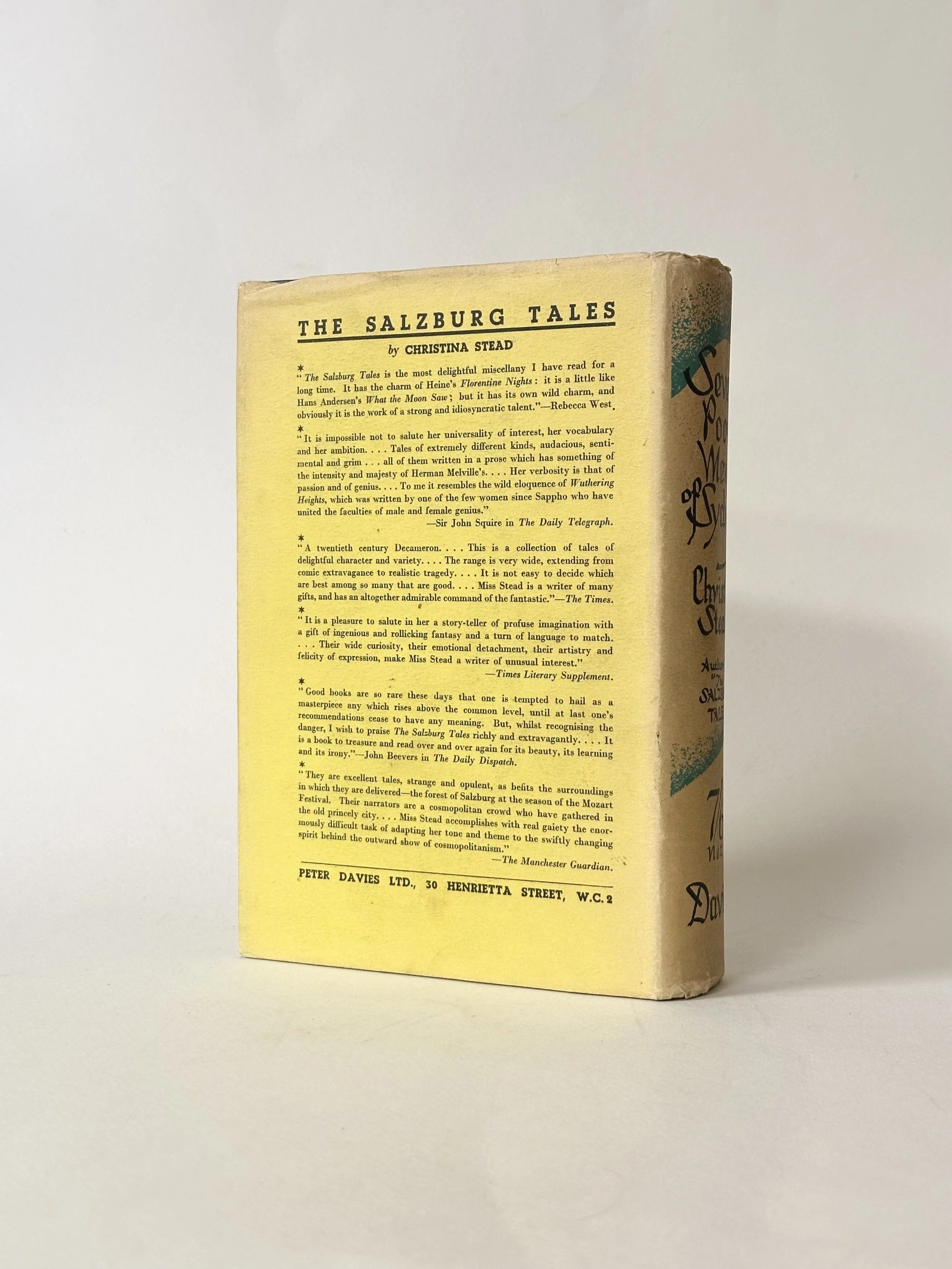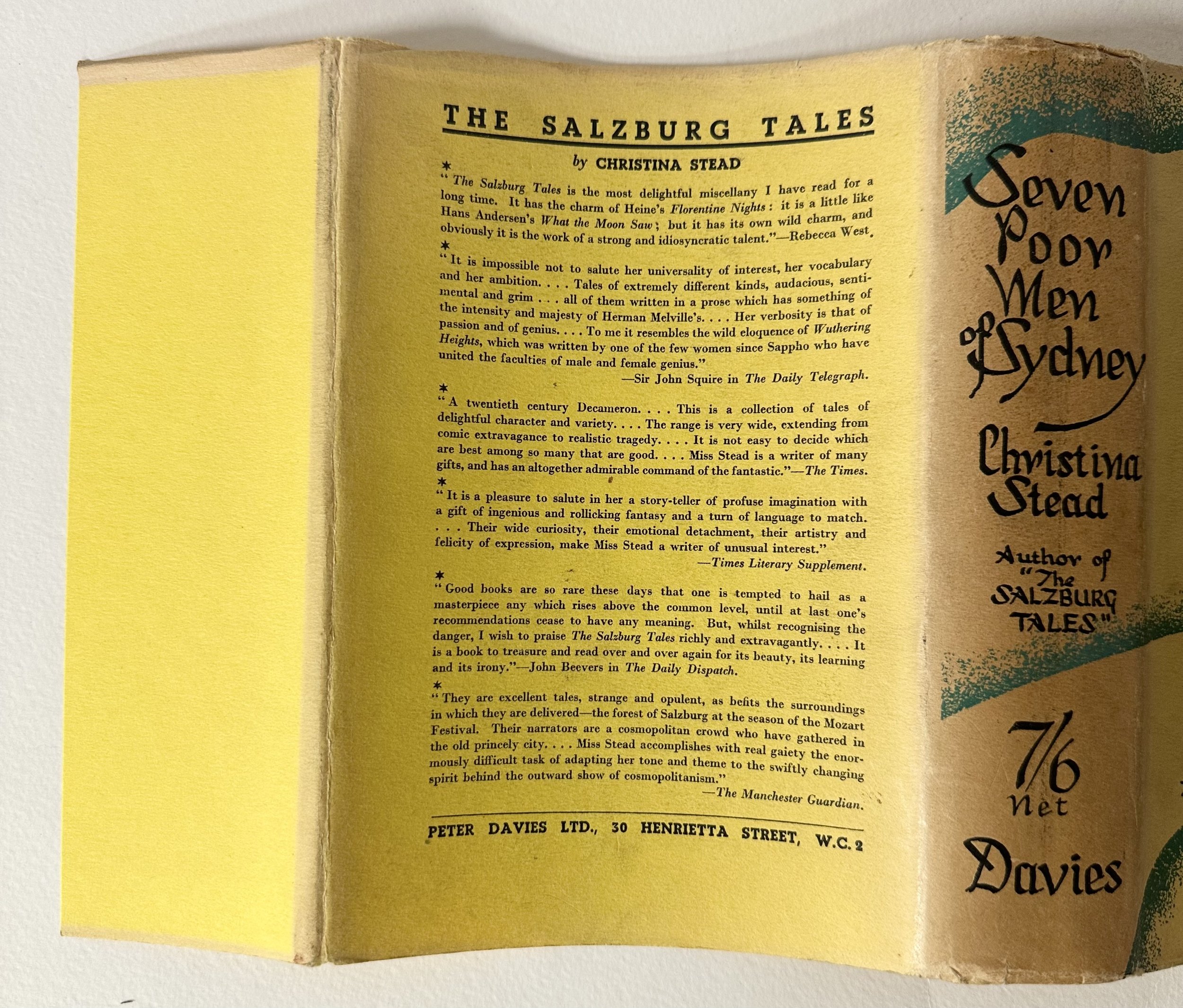 Image 1 of 6
Image 1 of 6

 Image 2 of 6
Image 2 of 6

 Image 3 of 6
Image 3 of 6

 Image 4 of 6
Image 4 of 6

 Image 5 of 6
Image 5 of 6

 Image 6 of 6
Image 6 of 6







STEAD, Christina. Seven Poor Men of Sydney
STEAD, Christina. Seven Poor Men of Sydney. London: Peter Davies. 1934. 8vo. First edition. Publisher’s attractive blue cloth lettered in gilt to the spine, in the dust jacket. From the library of Barry Humphries, famed for his character, Dame Edna, with his bookplate to the front pastedown designed by Roland Pym, who designed a few ex libris variations for Humphries. A very good or better copy, the cloth clean, the binding tight and square, the spine head and tail and the corners very gently bumped. The binding tight and square, with some light spots to the textblock edges. Some singular and occasional spots to prelims, then generally fine. The dust jacket priced 7/6 net to the spine panel, complete, the spine panel a touch faded, some edges gently bumped with one small closed tear to top edge. A smart example.
The Australian author’s first novel, published a few months after her short story collection, ‘The Salzburg Tales’. This one follows a band of social radicals and their labour-intensive, financially-strained dockworker lives, displaying ‘the fine descriptive power and subtle, ingenious turn of phrase, imaginative fancy and grim reality, uncanny insight into character and beauty and often majesty of prose’ [blurb]. The book was written on the back of Stead leaving her native Sydney for London and then Paris—she was working as a bank clerk on publication here—and might well be seen as a precursor to her magnum opus, The Man Who Loved Children in 1940, which sat in silence for a quarter of a century before a reissue gave it and Stead a new, deeper appreciation. Her legacy is now very much centred on her modernist and indeed feminist prose which can be seen here through her social realist subject matter. Scarce.
STEAD, Christina. Seven Poor Men of Sydney. London: Peter Davies. 1934. 8vo. First edition. Publisher’s attractive blue cloth lettered in gilt to the spine, in the dust jacket. From the library of Barry Humphries, famed for his character, Dame Edna, with his bookplate to the front pastedown designed by Roland Pym, who designed a few ex libris variations for Humphries. A very good or better copy, the cloth clean, the binding tight and square, the spine head and tail and the corners very gently bumped. The binding tight and square, with some light spots to the textblock edges. Some singular and occasional spots to prelims, then generally fine. The dust jacket priced 7/6 net to the spine panel, complete, the spine panel a touch faded, some edges gently bumped with one small closed tear to top edge. A smart example.
The Australian author’s first novel, published a few months after her short story collection, ‘The Salzburg Tales’. This one follows a band of social radicals and their labour-intensive, financially-strained dockworker lives, displaying ‘the fine descriptive power and subtle, ingenious turn of phrase, imaginative fancy and grim reality, uncanny insight into character and beauty and often majesty of prose’ [blurb]. The book was written on the back of Stead leaving her native Sydney for London and then Paris—she was working as a bank clerk on publication here—and might well be seen as a precursor to her magnum opus, The Man Who Loved Children in 1940, which sat in silence for a quarter of a century before a reissue gave it and Stead a new, deeper appreciation. Her legacy is now very much centred on her modernist and indeed feminist prose which can be seen here through her social realist subject matter. Scarce.
